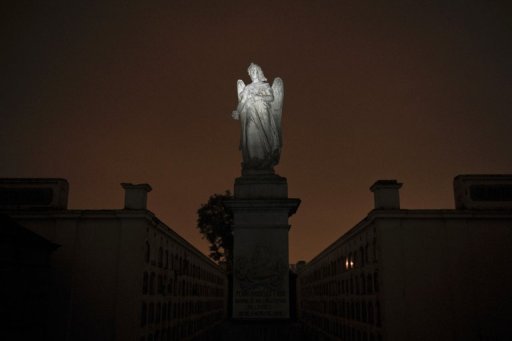

The oldest cemetery in Peru has become a hit with tourists and locals.
The Presbitero Maestro Cemetery was built between 1805 and 1808 on the former outskirts of Lima and was the first municipal cemetery in Latin America. This impressive and beautiful historical Sanctuary houses the final resting places of many historical important personalities, but is still in use. The neoclassical complex contains the largest collection of 19th century European marble sculptures in Latin America. It’s absolutely worth seeing!
It was cold and dark, and people clutching lanterns in the moonlight gave a spooky cast to Peru's oldest cemetery, now Lima's oddball hit with locals and tourists. "It is scary. But we're into it," said a teenage girl clinging to her boyfriend as they walked through darkness and silence interrupted only by visitors' footsteps.
Each group has a guide who entertain visitors with tales about those buried at the Presbitero Matias Maestro Museum-Cemetery, a Peruvian national historical monument.
The cemetery covers an area of 25,000 m². It has 6 magnificent main gates and over 220,000 people found their final resting place at this outstanding burial ground. Although the Presbitero Maestro Cemetery was declared a National Historic Monument in 1972 the sculptures and the impressive mausoleums are threatened by natural aging, air pollution, pressure of the growing population and unfortunately by vandalism. At least the Public Beneficence Society of Lima tries to preserve this jewel of peace with a very tight budget.
Night tours are scheduled with different themes for different crowds: one focuses on love; another on patriotic fervor; still others on presidents; and inevitably one focuses on death itself. "What really brings in the most people is the tour focused on death, in November, and another on love, in February," says historian Jose Bocanegra, who has the historical details at the ready.
Some visitors are so apprehensive about being in a cemetery that they tiptoe around expecting something worthy of a horror movie.
When tours started a decade ago they were limited to no more than 40 people; but they have become so popular that groups are now as large as 350 people, mainly young people and tourists, Bocanegra said.
One of the most popular tombs for local visitors is Peruvian poet Jose Santos Chocano, who asked to be buried standing, in a one square meter space. "So his coffin was placed in the niche vertically. And on his tombstone, there are lines from his poem 'Shipwrecked Life,'" Bocanegra said. "This square meter that I have looked for on Earth will be mine, if a bit late. Dead, in the end, I shall have it. ... I only expect now a square meter, where one day they'll have to bury me, standing," the poem reads.
It is a cemetery, and it is dark, to be sure. But there is enough light for visitors to stop and get a look at Carrara marble sculptures like the "La Dama de la Mantilla" (Lady in a mantilla) and "El bastón de Hermes" (Hermes' staff). Bronze works such as "A mother weeping at her son's tomb" and "A cry of pain" also are on display, steeped in the mood of the location, adorning mausoleums that are often caked in mud and apparently forgotten.
The cemetery, tucked into a corner of Lima's Barrios Altos district, was named for its designer, the priest Matias Maestro, who also was buried there. Opened in 1808 by Viceroy Fernando Abascal during Spanish colonial rule, the facility is a sort of history of Peru in tombs and crypts. Decorated with a staggering 940 sculptures -- some of them from as far away as Italy, by sculptors like Santo Varni, Pietro Costa, Ulderico Tenderini, and Rinaldo Rinaldi, or France's Jean Louis Barrias and Antonin Marcie.
The success of the tours is a blessing for the facility, providing a source of funding to care for tombs and sculptures that have themselves often seemed on their last legs.
One of the most popular tombs for local visitors is Peruvian poet Jose Santos Chocano, who asked to be buried standing, in a one square meter space. "So his coffin was placed in the niche vertically. And on his tombstone, there are lines from his poem 'Shipwrecked Life,'" Bocanegra said. "This square meter that I have looked for on Earth will be mine, if a bit late. Dead, in the end, I shall have it. ... I only expect now a square meter, where one day they'll have to bury me, standing," the poem reads.
It is a cemetery, and it is dark, to be sure. But there is enough light for visitors to stop and get a look at Carrara marble sculptures like the "La Dama de la Mantilla" (Lady in a mantilla) and "El bastón de Hermes" (Hermes' staff). Bronze works such as "A mother weeping at her son's tomb" and "A cry of pain" also are on display, steeped in the mood of the location, adorning mausoleums that are often caked in mud and apparently forgotten.
The cemetery, tucked into a corner of Lima's Barrios Altos district, was named for its designer, the priest Matias Maestro, who also was buried there. Opened in 1808 by Viceroy Fernando Abascal during Spanish colonial rule, the facility is a sort of history of Peru in tombs and crypts. Decorated with a staggering 940 sculptures -- some of them from as far away as Italy, by sculptors like Santo Varni, Pietro Costa, Ulderico Tenderini, and Rinaldo Rinaldi, or France's Jean Louis Barrias and Antonin Marcie.
The success of the tours is a blessing for the facility, providing a source of funding to care for tombs and sculptures that have themselves often seemed on their last legs.



















0 comments:
Post a Comment